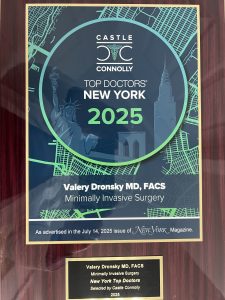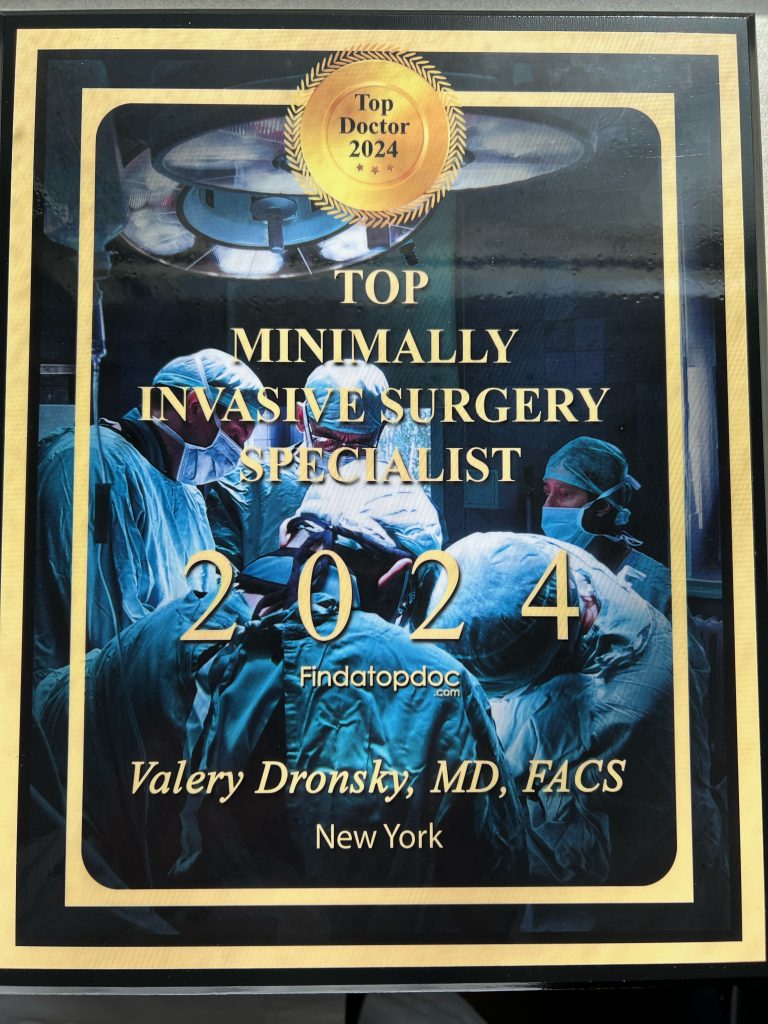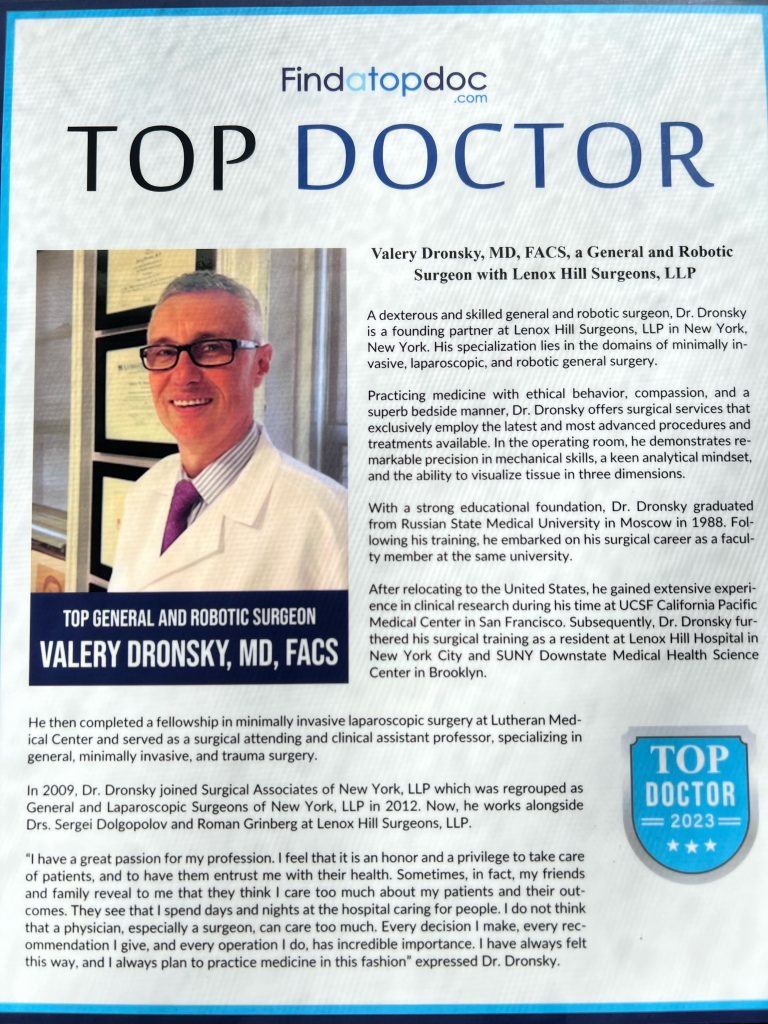CALL TODAY 646-846-1136 | EMAIL
Surgical Experts Dedicated to Improving Lives
At Lenox Hill Minimally Invasive Surgery PLLC, Dr. Valery Dronsky and his staff of medical professionals provide compassionate care with the highest ethical & professional standards. In our state of the art facility, we offer surgical services using only the most cutting edge and current procedures and treatments. We specialize in general surgery, including extensive experience in performing hernia repair surgery. Our expertise is in minimally invasive surgery and robotic surgery. Minimally invasive and robotic surgery often allow patients to experience easier recovery than traditional open surgery. They also allow for more precise and less traumatic surgery. When robotic and minimally invasive surgery is not an option, we are also skilled and experienced in traditional open surgical procedures.
Dr. Dronsky is an experienced and highly skilled surgeon having undergone extensive training in school, residency and fellowships. He practices medicine with ethical behavior, compassion and superb bedside manner. In the operating room he exhibits precision mechanical abilities, analytical thinking and the ability to visualize tissue in three dimensions. These innate and learned skills allow Dr. Dronsky to be one of the most dexterous and skilled professionals in New York City and the Country.
Call us: 646-846-1136
PATIENT TESTIMONIALS
Recent Awards
We are honored and deeply appreciative to have consistently received prestigious awards and recognition year after year, establishing us as one of New York’s foremost hospitals for a wide range of general surgeries, safety measures, specialized procedures, and overall excellence in healthcare. At Lenox Hill Minimally Invasive Surgery, our unwavering commitment lies in delivering exceptional care and unwavering support to our patients, guaranteeing their safety and successful recovery throughout their entire surgical experience.
Hospital Quality Awards
 America’s 50 Best Hospitals Award™ (2023, 2022)
America’s 50 Best Hospitals Award™ (2023, 2022)
Top 1% in the nation for providing the highest clinical quality year over year.

America’s 100 Best Hospitals Award™ (2021)
Top 2% in the nation for consistently delivering clinical quality year over year.

America’s 250 Best Hospitals Award™ (2023, 2022, 2021)
Top 5% in the nation for consistently delivering clinical quality.

Patient Safety Excellence Award™ (2023, 2022)
Top in the nation for providing excellence in patient safety by preventing infections, medical errors, and other preventable complications.
Specialty Clinical Quality Awards

America’s 100 Best Hospitals for Cardiac Care Award™ (2023, 2022, 2021, 2020, 2019)
Superior clinical outcomes in heart bypass surgery, coronary interventional procedures, heart attack treatment, heart failure treatment, and heart valve surgery.

America’s 100 Best Hospitals for Coronary Intervention Award™ (2023, 2022, 2021, 2020, 2019)
Superior clinical outcomes in coronary intervention procedures (angioplasty with stent).

America’s 100 Best Hospitals for Prostate Surgery Award™ (2023, 2022, 2021)
Superior clinical outcomes in prostate removal surgery and transurethral resection of the prostate.
Click to see all of our Healthgrades best doctors awards





Visit our main website at www.LenoxHillMinimallyInvasiveSurgery.com
Blog Posts are Below:
Monthly Archives: November 2019
Laparoscopic Colon Resection
What Is Laparoscopic Colon Resection? The human digestive system comprises organs that help break down the food, absorb nutrients, and excrete waste material from the body. When you eat something, the food travels from the mouth to the stomach through the esophagus.
The food then enters the small intestine where it is absorbed, and the un-dissolved nutrients move into the large intestine (colon). The colon stores the waste until it is removed through rectum or anus. The large intestine is vital to the digestive system, and adverse effects of a medical condition may require you to go through surgical intervention.
What Is Laparoscopic Colon Resection?
Essentially, Colectomy or colon resection is a surgical technique to treat the diseases affecting your colon, such as colon cancer. During the surgery, the doctor removes the cancerous part of the colon. Depending upon the severity, the surgeon may perform
- Total colectomy – removing the colon completely
- Partial Colectomy – removing a part of the colon affected by cancer
- Hemi-colectomy – removing the left or right half of the colon.
- Proctocolectomy – removing both the colon and rectum
After the removal of the cancerous portion, the surgeon sews the healthy ends of the colon to leave enough space for the waste to leave the body. However, if the surgeon has cut the colon completely, then he/she may perform a colostomy.
Conditions That Colectomy Treats
A patient may undergo a colon resection for various medical conditions associated with the large intestine. For instance, you may need surgery for colon cancer, polyps, inflammatory bowel diseases, obstruction in the intestine, bleeding, and other problems.
- Intestinal Blockage: Obstruction in the colon calls for urgent medical help. The surgeon may perform a total or partial colectomy to clear the colon.
- Colon Cancer: Colon cancer affects more than 100,000 US citizens each year. However, proper screening may help prevent cancer. For the newly developed cancer, the surgeon may remove a part of the colon. On the other hand, for advanced-stage cancer, the doctor is likely to remove a bigger portion of the intestine.
- Excessive Bleeding: To treat uncontrolled bleeding, the surgeon may perform partial colectomy.
- Diverticulitis: In the case of complex diverticulitis, the surgeon may remove the affected area of the colon.
Preparation for the Surgery
Colon resection is a major surgical procedure, and it is better to take some preventive measure before the surgery day.
- Talk to your doctor and avoid the medicines that may complicate the surgical procedure.
- For certain colon resections, your doctor may ask you to keep fast hours before the surgery.
- In some situations, the surgeon may prescribe antibiotics to evade a possible infection.
- Your colon has to be empty before the surgery. And for this purpose, the surgeon may give you an oral solution to drink hours before the surgery.
The Surgical Procedures
Your surgeon may perform the surgery in either of the following ways:
Open Colectomy
During the traditional open surgery, the surgeon makes a large cut in the abdomen to access the colon. With the help of the surgical tools, the doctor then removes the affected tissues surrounding the colon. He/she may go for total or partial colectomy.
Laparoscopic colectomy
The minimally invasive technique, also called laparoscopic colectomy, involves several tiny incisions in the abdomen. The surgeon may mark as many as 4 to 5 cuts and insert a laparoscope through one of them.
The real-time video helps the surgeon monitor the patient’s internal organs. With a surgical tool, the doctor takes out the colon from the body and removes the affected part. After the removal, the surgeon places the colon back in the abdomen through an incision.
Final Thoughts
Laparoscopic colon resection does not cause pain or discomfort, and the patient recovers faster as compared to open colectomy. If your colon is affected and requires a colon resection, Lenox Hill Minimally Invasive Surgery is the right place in NYC. Our dedicated and skilled surgeons have expertise in minimally invasive surgeries, and we provide quality healthcare. Contact us today and book an appointment with the best surgeons in town.
LENOX HILL MINIMALLY INVASIVE SURGERY
117 E 77th Street
Suite 1A
New York, NY 10075
Surgery For The Appendix
Appendix Surgery or Appendectomy involves the removal of appendix after the occurrence of appendicitis. Let’s find out about when you need an appendix surgery, what the procedure involves, and where to get best surgeons for appendectomy.
Why do People Get an Appendix Surgery?
Appendicitis is a serious medical condition that requires an appendix surgery. It occurs due to the infection in the appendix because of growing bacteria or clogging of the stool in the appendix. The infection causes inflammation and severe pain that is only treatable with the removal of the appendix. In the case of an accident or serious injury that causes the trauma and appendicitis, appendectomy is the only surgical option available. Peritonitis is a serious condition resulting from the inflammation of the appendix and can cause the appendix to rupture.
Procedure for Appendix Surgery
First, the surgeon will administer the patient with certain antibiotics to prevent the overgrowth of bacteria. The dose of antibiotics will depend upon the degree of the damage. In the case of sepsis, the patient would have a single dose of injectable antibiotic. If the appendix has ruptured already, the surgery will start without administering the antibiotics.
The patient will undergo general anesthesia before the surgery. For the surgery, there are two common methods; open surgery and laparoscopic surgery.
Open Surgery for the Appendix Removal
The surgeon will sterilize the skin with a germ-killing solution first. In rare cases, the surgeons do need to shave the skin in the appendix area. The surgeon will then cut the skin deeply (2-3 inches) to open the portion of lower abdomen to expose the appendix. If there is some mass growing on the appendix, the surgeon will make incisions on the mass as well.
Beneath the skin, the surgeon will make incision through the layer of protective tissues and abdominal walls to reach the appendix. Once the surgeon identifies the location of the appendix, he/she will carefully cut the appendix and remove it out of the patient’s body. After that, the surgeon will stitch the peritoneum layer, which he/she had previously ruptured for the removal of the appendix. The surgeon will stitch the skin of the lower abdomen.
Minimal Invasive Laparoscopy
Laparoscopy is the recent trend in surgical procedures, which involves cutting certain a part of an organ or removing if entirely. This process involves making three small incisions (of ¼ or ½ inches) to expose and remove the appendix instead of opening a larger portion of the stomach or lower abdomen. This surgery also uses a small camera or laparoscope, which is a mini tv-like monitor to show the appendix and the surgery procedure in an enlarged view. To remove the appendix laparoscopically, our surgeons have special instruments that can easily perform the surgery without any deep incisions.
Advantages of Laparoscopic Appendectomy
Laparoscopic appendectomy has several benefits over the open surgery appendectomy.
- The surgeon will make only a few stitches on the patient’s body. This means the post-operative pain significantly reduces in this procedure as compared to an open surgery.
- The recovery is also quicker.
- The patient achieves the normal functioning of the bowel quickly.
- The hospital stay is lesser for laparoscopic surgery.
- Laparoscopic surgery gives better cosmetic results. The stitch marks do not look horrible.
—
Are you having problems with your appendix? Call us at 212-988-1136 to book an appointment. We have NYC’s best surgeons for laparoscopic appendix surgery. For more information visit our main website.















